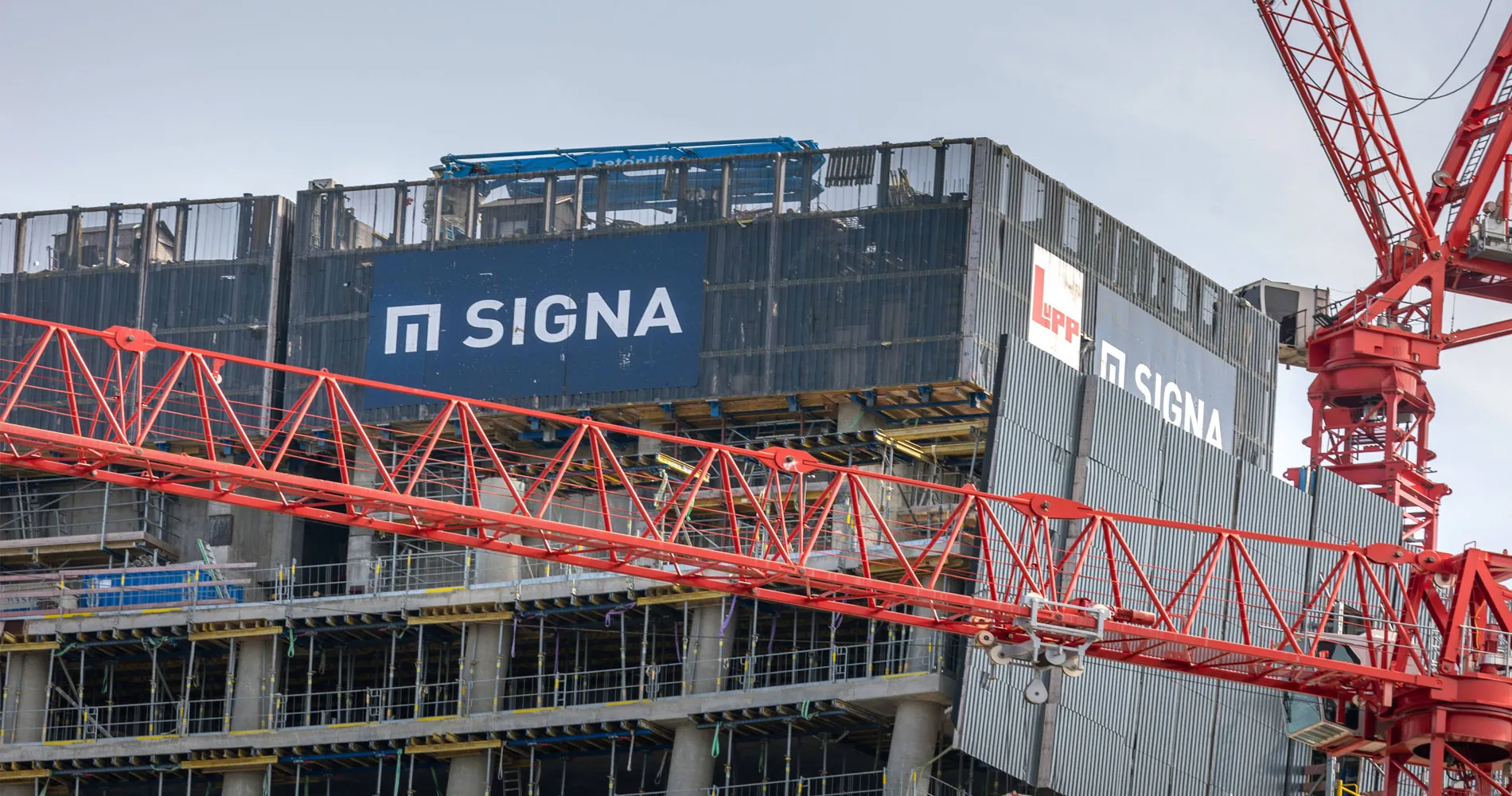The former high-flyer of Austrian property developers has been in custody since the end of January 2025. But how could the former superstar and media darling of the industry, whose proud project portfolio ranged from the top location in Central Europe to the Chrysler Building in New York, fall so far? iGlobenews has reconstructed Benko’s fall from grace.
Alexandra Dubsky
20 February 2025
German version
It was a rocket-like rise of the former high-school school dropout which started in 1995 with the renovation of attics in his home town of Innsbruck in Tyrol. In 2000, he founded “Immofina”, which was renamed Signa in 2006. Benko, who is said to have great powers of persuasion and a phenomenal memory for figures, was highly successful in attracting investors. A lot of money flowed in – where exactly it came from was not always clear to outsiders. As early as 2006, Benko’s name appeared in Italian investigations “into money laundering activities attributed to Russian criminal organizations based on Lake Garda”, according to Italian judicial files. However, the Carabinieri’s suspicions could not be confirmed at the time.
The Galeria/Karstadt/Kaufhof department store chain received a full EUR 460 million in 2021 and another EUR 250 million in 2022 from German taxpayers to save jobs. At the same time, Signa Holding made a profit of EUR 800 million and Benko paid himself EUR 100 million in dividends. In the same year he laid off 4000 employees and closed 41 stores according to the Wiener Zeitung in February 2023.
In November 2023, the Tyrolean real estate developer Benko and his Signa Holding slipped into the largest insolvency in the Second Republic of Austria. Benko’s mountain of debt is estimated at 2.4 billion euros – and rising. The serious criminal charges against the 47-year-old: Falsified investments – “money carousel”; questionable sale of Villa Eden Gardone; concealment of assets; possible falsification of evidence; unclear use of funds in the Franz real estate project in Munich; unlawful corona aid for Chalet N in Oberlech; misleading Schelhammer Capital Bank to extend a loan; and post haggling around Thomas Schmid.
Benko is also alleged to have orchestrated a money carousel and defrauded investors in the process – he pretended to invest, which in reality did not happen. The Public Prosecutor’s Office for Economic Affairs and Corruption (WKStA) is currently investigating the suspicion that investors were misled into participating in a capital increase by Signa Holding, while it was falsely suggested that the Benko private foundations were also contributing financially. Investigators suspect that around EUR 35 million, which had already been paid in by other investors, had been circulated.
Benko has been in custody since 23 January 2025.
The entrepreneur, who came from a modest background, was considered a prodigy of the real estate industry for decades. With his Signa Holding, he acquired several magnificent palaces in Vienna’s city center, shaped entire cityscapes – such as the Goldenes Quartier in Vienna’s first district. He built skyscrapers both in Austria and abroad, such as the Elbtower in Hamburg, which is now an unfinished ruin thanks to Benko.
The German retail groups Karstadt and Kaufhof were also part of his impressive portfolio, as was the legendary Chrysler Building in Manhattan. Benko even temporarily took his online sports retailer Signa Sports United to Wall Street.
In the Austrian business magazine Trend, Benko formulated his company vision “Signa should be a family-owned European industrial and investment holding company, similar to the family holdings of the Agnellis, Oetkers or Reimanns”. In 2011, Benko was named Man of the Year by Trend for the first time, and again six years later – Trend had never before awarded this multiple honor. The German media also showered him with roses. Handelsblatt named Benko “Strategist of the Year” in 2018. A year later, Forbes magazine even ranked him among the richest people in the world in 2019 with a net worth of EUR 4.6 billion.
Benko, who maintained his luxurious lifestyle until his arrest, used his private foundations, in which assets in the hundreds of millions are parked, to finance it. The main beneficiary of this private foundation is his mother Ingeborg Benko, a retired kindergarten teacher.
Today, evidence in the form of emails, chats and telephone logs from investors, an insolvency administrator and former foundation board members incriminates the insolvent Tyrolean. The German Fressnapf owner and major investor Torsten Toeller has testified that Benko acted as an “all-powerful autocrat” both in the Signa Group and in the group of companies surrounding his Laura Private Foundation (named after Benko’s daughter Laura).
Building contractor and Signa investor Hans Peter Haselsteiner referred to Benko’s statements such as “mom always gets the money from the Laura Private Foundation”, “mom gives it to me” and “mom buys something from us”. Haselsteiner also said that the Laura Private Foundation had never become involved in contracts or agreements on its own initiative – rather, Benko had always become personally active. Accordingly, the WKStA assumes that Benko manages the interests of the foundation like an owner, has direct access to its assets and acquires considerable financial contributions to finance his opulent lifestyle.
The WKStA cited a chat in which an employee asked “René, may I take 1.5 million from the LPS (Laura Private Foundation, editor’s note) to serve the tax office at various levels?” – to which Benko agreed within seconds.
Nina Tomaselli, from the Green Party, is now campaigning for foundations to become more transparent. According to Tomaselli, the so-called supplementary foundation deed needs to be disclosed so that all beneficiaries of the foundation are named. Foundations, like corporations, should also be obliged to publish their annual financial statements. In addition, the tax authorities need specialized industry teams to analyse private foundations in detail. Tomaselli plans to propose ammendments to the laws regulating private foundations by the end of February 2025.
“Unfortunately, there are abuses in every legal form,” lawyer Dr. Werner Loibl told iGlobenews. Private foundations are, in principle, a sensible way of keeping assets in the country, but an amendment to the Private Foundations Act would probably make them less attractive and harm Austria as a business location, he said. Loibl did not think much of legislation for special reasons, otherwise “you are throwing the baby out with the bathwater.”
Benko’s arrest also throws a spotlight on the supervisory board responsibility of prominent personalities such as ex-SPÖ (Social Democrat Party) Chancellor Alfred Gusenbauer, ex-FPÖ (Freedom Party) Vice-Chancellor Susanne Riess-Hahn, ex-Raiffeisen International board member Karl Sevelda and ex-Bank Austria boss Karl Samstag. All four were active on the supervisory board of the SIGNA subsidiary Signa Prime Selection and should actually have monitored the dubious business practices of all Benko managing directors and their now imprisoned main protagonist.
Gusenbauer, Riess-Hahn and Sevelda all tried to leave the collapsing Signa in time and resigned from the Supervisory Board in February 2024. However, Benko’s arrest could now put them back at the center of the investigation. According to insolvency administrator Norbert Abel, they actions have significantly harmed the interests of the creditors. Abel therefore sent liability letters to the former supervisory board members in January 2025 and held them responsible for losses of more than EUR 1 billion. The presumption of innocence applies to all those named.
The coming months will show whether and how it will be possible in future to limit such high entrepreneurial risks, which cause enormous government expenditure at the taxpayer’s expense if they do not succeed. So far, Benko has remained silent about the allegations against him.







